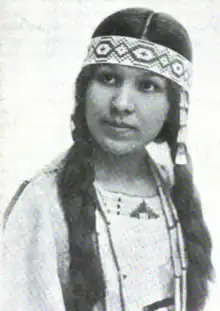Irene Eastman
Irene Taluta Eastman (February 24, 1894 – October 23, 1918) was an American singer.
Irene Eastman | |
|---|---|
 Irene Eastman, from a 1917 magazine | |
| Born | February 24, 1894 St. Paul, Minnesota |
| Died | October 23, 1918 Keene, New Hampshire |
| Other names | Taluta |
| Occupation | Singer |
| Parent(s) | Charles Eastman, Elaine Goodale Eastman |
Early life and education
Irene Eastman was born in Saint Paul, Minnesota, one of the six children of Charles Eastman and Elaine Goodale Eastman.[1][2] Her father was a noted physician and a Santee Sioux born in Minnesota;[3] her mother was a white writer and educator from Massachusetts.[4] Her parents met at Wounded Knee.[5]
Career
Eastman, a soprano, sang, danced, and told stories in various venues,[6] including the Buffalo Society of Natural Sciences[7] Hampton Institute,[8] historical societies, community groups, and opera houses.[9] She dressed in a leather beaded costume for her performances.[10][11][12]
The music Eastman performed was not from any one specific Native tradition, but a pastiche that evoked an idea of Native cultures for non-Native audiences. "The stories were put to classical notes, and especially harmoniously arranged with all admirable Indian atmosphere saved", explained a 1915 report.[10] Hamlin Garland wrote to Eastman's mother that her "charming presence and sweet and sympathetic voice gave even the dullest of her hearers a realizing sense of the wild beauty which had its place in a world that is almost gone."[1]
Personal life
Eastman died in 1918 from influenza, during the worldwide flu pandemic, at the age of 24.[11] Her parents separated soon after her death.[13] There is an oil portrait of Eastman by Wallace Bryant, in the collection of the Hood Museum of Art at Dartmouth College.[14]
References
- "Men and Women Whose Lives Count for the Red Man's Cause". The American Indian Magazine. 5 (4): 263. October–December 1917.
- "Daughter of Poet Sings Tribal Songs". The Pittsburgh Press. 1914-03-25. p. 13. Retrieved 2023-08-21 – via Newspapers.com.
- Eastman, Charles A. (2007). The Essential Charles Eastman (Ohiyesa): Light on the Indian World. World Wisdom, Inc. ISBN 978-1-933316-33-8.
- Sargent, Theodore D. (2005-01-01). The Life of Elaine Goodale Eastman. U of Nebraska Press. ISBN 978-0-8032-4317-0.
- Eick, Gretchen Cassel (2020-10-14). They Met at Wounded Knee: The Eastmans' Story. University of Nevada Press. ISBN 978-1-948908-73-3.
- Vigil, Kiara M. (2015-07-15). Indigenous Intellectuals: Sovereignty, Citizenship, and the American Imagination, 1880–1930. Cambridge University Press. p. 57. ISBN 978-1-316-35217-5.
- "Natural Science Society". The Buffalo Commercial. 1916-02-08. p. 9. Retrieved 2023-08-21 – via Newspapers.com.
- Ludlow, Helen W. (January 1919). "Irene Eastman". The Southern Workman. 48 (1): 3–4.
- "Taluta Coming". The Buffalo Times. 1918-01-12. p. 7. Retrieved 2023-08-21 – via Newspapers.com.
- "Camp Fire Girls Entertain; Indian Song Recital by Miss Irene Eastman (Taluta)". The Chatham Press. 1915-05-22. p. 1. Retrieved 2023-08-21 – via Newspapers.com.
- "Girl Well Known Here Dies in New Hampshire". The Tribune. 1918-10-26. p. 15. Retrieved 2023-08-21 – via Newspapers.com.
- "Miss Irene Easton Addresses Rotarians". Wilkes-Barre Times Leader. 1918-05-01. p. 18. Retrieved 2023-08-21 – via Newspapers.com.
- Dobrow, Julie; Wilson, Raymond (March 2022). "'Good Night, Irene': The 1918 Influenza Pandemic and Irene Taluta Eastman". South Dakota History. 52 (1).
- "Irene Taluta Eastman (1894-1918)". Hood Museum. Retrieved 2023-08-21.